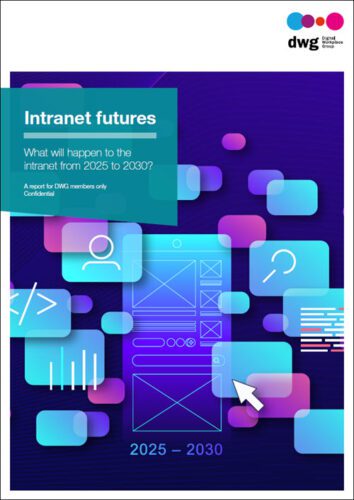Award entrants challenge digital workplace teams to listen, measure and think differently
Entries are now open for the 2021 Digital Workplace of the Year Awards. Now in their fifth year, the awards regularly attract entries from a range of organizations in different sectors from around the world.
In 2020, the judging panel was wowed by the entry from DBS Bank, which took away the prestigious award for Digital Workplace of the Year 2020 live on air at DWG24, presented by DWG CEO Paul Miller. In addition to the main winner, several other organizations picked up special category awards for achievements in specific areas of practice, such as user engagement and strategic vision.

Entrants to the awards are challenged to perform on a range of digital workplace dimensions: strategy, business case, governance, impressive features, user engagement and impact. In other words, it’s not just about the ‘whizz bang’ exciting stuff at the front end (although the judging panel do love this!) – it’s also about an ambitious, robust, well thought-out programme that can be sustained over the long term.
2020 may have been a tough year, but digital workplace teams proved keen to enter the awards and to tell others about the essential work they had been doing to help their organizations keep working (more on that in a later post). They also shared advice for their peers in the industry. Three themes emerged particularly strongly:
1. Opinion is over-rated
Whether it be that of a digital expert on the team or a particular senior leader, entrants were clear that opinion is over-rated when it comes to designing the digital workplace. Listen, observe and enter as deeply as you can into the daily lives of employees to understand behaviours, pain points and needs. Some of the best programmes we saw in the awards were rooted deeply in improving the daily lives of the organization’s workforce and demonstrating the ripple effect this can have for customers or service users.
As category winner City of Malmö put it: “Using the argument of user behaviours, rather than handling opinions from a specific occupation or an organizational standpoint, is to your advantage. Also, they don’t change as often as the organization charts tend to. Behaviours make people recognize themselves, increase buy-in, and you can more easily divert internal politics.”
Teams with a laser focus on people were consistently preoccupied with enabling employees to do their best job, making their lives easier, removing bumps in the (digital) road, improving their performance and productivity, and even (in the case of DBS Bank) making work more joyful!
2. Measure as you go
Metrics and measurement as an afterthought is an all too familiar story and one that holds back digital workplace progress for a lot of organizations. However, many of the award entrants were highly data focused right from the inception of their programmes. One entrant said that, although they started small with their programme, they used any data about the existing tools they could lay their hands on to help make the case, underpin action and track progress. Thinking back to the first theme, having some data at your fingertips also makes it easier to cut through opinion to get at what really matters.
A combination of quantitative and qualitative measures was favoured in order to build a rounded picture – including employee feedback, engagement metrics, cost savings, productivity gains, and more. Category winner, Refinitiv, particularly excelled at demonstrating hard numbers for the digital workplace programme. In a multi-phase digital workplace programme, the team has already reported cost reductions of $4,000 per user due to platform consolidation, as well as a 21% improvement in productivity through frictionless adoption and reductions in time spent searching and case handling.
3. Challenge what you know
Push boundaries, experiment and innovate. Running through quite a few of the entries was a vein of thinking differently and challenging what you know. Entrants brought this attitude to their digital workplace programmes in a variety of ways: from testing ideas and failing fast, to allowing users to experiment and explore, to reimagining how we work (digitally) by stepping outside the boundaries of how we think of it today.
Winners DBS Bank were emphatic on this point: “Do not limit innovation to what is known today; always challenge the ‘best’ standards today and create something better, or a new way of working that people never knew they needed.”
This resonates for us strongly at DWG, where – as well as doubling-down on foundational practices like governance and measurement – we also like to imagine new ways of envisioning the world of work. Our (free) reports Digital Workplace 2030: Preparing now for the digital worlds of work to come and Nature of Work: Designing at the interface of the physical and digital workplace explore such ideas.
The Digital Workplace of the Year Awards, produced by Digital Workplace Group, celebrate those organizations and practitioners who have excelled at creating well-executed, high-performing digital workplace environments.
The awards give you and your organization the opportunity to share your digital workplace achievements with peers and to gain global, industry recognition.
For 2021 there are three categories:
- Digital Workplace of the Year 2021 (awarded to an organization) – open to submission by any organization, with one overall winner and several category awards
- Digital Workplace Leader of the Year 2021 (awarded to an individual) – nominated by peer experts, with one overall winner and several category awards
and NEW for 2021…
- Modern Intranet of the Year 2021 (awarded to an organization) – open to submission by any organization, with one overall winner and several category awards.
The entry and judgement criteria for these global awards are underpinned by the collective knowledge and experience of DWG research, benchmarking and expertise plus extensive industry insights.
Categorised in: → Digital Workplace Group Awards

